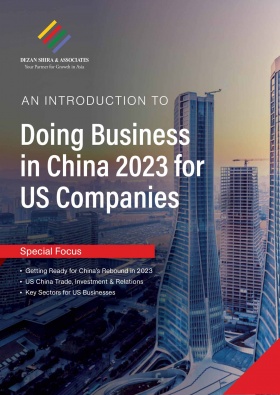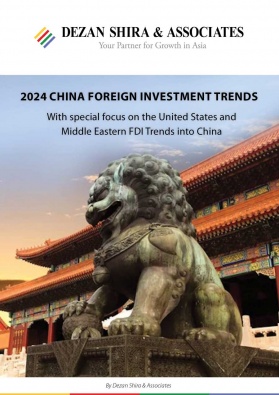China Corporate Presence and Investment in the US
China has established a considerable corporate presence and investment in the US, contributing to the country’s economic landscape and fostering exchanges between the two nations.
Chinese firms have become increasingly prominent in the US, contributing to the dynamic landscape of the country’s business environment. Arguably, the influx of Chinese companies into the US market has created a multifaceted impact on various sectors, fostering collaboration, competition, and innovation.
As of the end of 2022, data indicates the operation of around 5,000 Chinese-owned companies in the United States, spanning diverse industries such as technology, manufacturing, finance, and real estate. Notably, the growth rate of Chinese firms entering the US market has demonstrated a consistent annual increase of 8 percent over the past five years.
In this article, we look at a recent case of a Chinese law firm’s expansion in the US, zooming out to capture the broader landscape of Chinese corporate presence overseas.
A recent case: Han Kun Law Firm’s expansion in the US
On December 18, 2023, Han Kun Law Offices (hereinafter referred to as ‘Han Kun’), in Chinese 汉坤律师事, officially opened Han Kun LLP (or Han Kun NY) at the Rockefeller Center in New York City. Following the successful launch of Han Kun’s Singapore office in June, this move solidifies the firm’s commitment to global expansion.
Indeed, Han Kun NY, established as a New York limited liability partnership, demonstrates the firm’s ambition and dedication to serving clients worldwide. This development is a crucial step in strengthening the firm’s global network and providing a platform for clients with international operations.
Founded in 2004, Han Kun has emerged as a powerhouse in the international legal arena with a commitment to excellence and a robust presence across key global markets. The firm, widely recognized as one of China’s most prestigious law practices, specializes in financing and investment-related areas, serving a distinguished clientele comprising multinational companies, funds, and top-tier firms from new economic sectors.
Its strategic expansion began with the opening of its Shenzhen office in 2009, followed by a foray into the Hong Kong market in 2014, where it merged with a local law firm. Notably, in 2015, the firm formed an alliance with Italian law firm Gianni, Origoni, Grippo, Cappelli & Partners, facilitating collaborative efforts on advising clients in China, Hong Kong, and European investments.
In 2022, a significant merger agreement was reached with Shanghai-based Young-Ben, solidifying Han Kun’s presence in the finance and commercial dispute resolution domains. The firm continued to expand its footprint with the official openings of offices in Haikou and Wuhan in 2022 to meet the growing demand for high-quality legal services.
Han Kun’s global strategy took a remarkable turn with the official opening of its Singapore office in June 2023, marking the first international office established outside of China. The move highlights the firm’s commitment to providing comprehensive legal services on a global scale.
The latest announcement of the opening and operation of Han Kun LLP in New York City further accentuated the firm’s determination to extend its reach into the heart of international business and finance.
Today, Han Kun’s main practice areas encompass a wide spectrum, including antitrust and competition, banking and finance, capital markets, dispute resolution, and more. The firm’s impressive client roster includes renowned entities such as J.P. Morgan, UBS, Tencent, Baidu, JD.com, and international giants like Toyota, Samsung, and Pfizer.
Chinese investment in the US
The juxtaposition of Chinese companies’ evolving dynamics in the US economy and their substantial investments provides a nuanced perspective on the complex US-China economic relationship. On one hand, the tangible presence of Chinese companies as investors and employers in the United States has seen a contraction since 2017. This reduction in physical footprint is contrasted by the surge in Chinese exports to the US, reaching an unprecedented US$564 billion in 2022.
China’s reliance on exports to serve the US market, rather than establishing a significant local presence through Foreign Direct Investment (FDI), presents a distinctive pattern.
While the diminishing prospects of Chinese firms contributing significantly to local job creation in the US may amplify the inclination towards more restrictive economic policies concerning China, it’s also crucial to acknowledge the contribution of Chinese investment in the US economic landscape, as a whole. Up to the first half of 2023, Chinese companies have invested a substantial US$53 billion in US facilities. This investment, though less than half of the US investment in China, has led to the creation of over 119,000 direct jobs.
One sector where Chinese investments have notably made a mark is the automotive industry. Exemplified by companies like BYD, the electric vehicle (EV) maker that is expanding its presence in in California, or Fuyao, an automotive glass maker in Ohio, these success stories underscore the positive impact of Chinese investments, contributing to expansion and innovation within the US manufacturing sector.
Future prospects
During a meeting organized by the China General Chamber of Commerce in May 2023, Craig Allen, President of the US-China Business Council, emphasized the positive role played by US affiliates of Chinese companies. He argued that welcoming Chinese investment, especially when it replaces Chinese imports, contributes not only to the specific sectors involved but also to the broader US economy.
Moreover, a survey conducted by the China General Chamber of Commerce and presented in the same occasion, indicated that despite existing bilateral tensions between the two countries and their ever-evolving relations, a remarkable 94 percent of Chinese businesses expressed their intention to either increase or maintain their fixed investment in the US in the coming year. This data reflects a continued interest and confidence among Chinese companies in the US market, and the resilience of economic ties between the two nations.
This momentum is further accentuated by recent diplomatic developments. On November 15, 2023, Chinese President Xi Jinping and US President Joe Biden engaged in their first face-to-face meeting in a year. The meeting resulted in the establishment of several areas of cooperation, spanning artificial intelligence (AI) governance, counternarcotics, defense, and commitments to enhancing transport links. Additionally, both nations pledged to expand educational and cultural exchanges.
If successful, these commitments are likely to signify the enduring intertwining of the two economies, fostering seamless exchanges, both in terms of business activities and the investment landscape.
About Us
China Briefing is written and produced by Dezan Shira & Associates. The practice assists foreign investors into China and has done so since 1992 through offices in Beijing, Tianjin, Dalian, Qingdao, Shanghai, Hangzhou, Ningbo, Suzhou, Guangzhou, Dongguan, Zhongshan, Shenzhen, and Hong Kong. Please contact the firm for assistance in China at china@dezshira.com.
Dezan Shira & Associates has offices in Vietnam, Indonesia, Singapore, United States, Germany, Italy, India, and Russia, in addition to our trade research facilities along the Belt & Road Initiative. We also have partner firms assisting foreign investors in The Philippines, Malaysia, Thailand, Bangladesh.
- Previous Article Navigating Hong Kong’s ESG Landscape: Regulations, Trends, and Opportunities
- Next Article 2024 Import-Export Tariffs in China

























